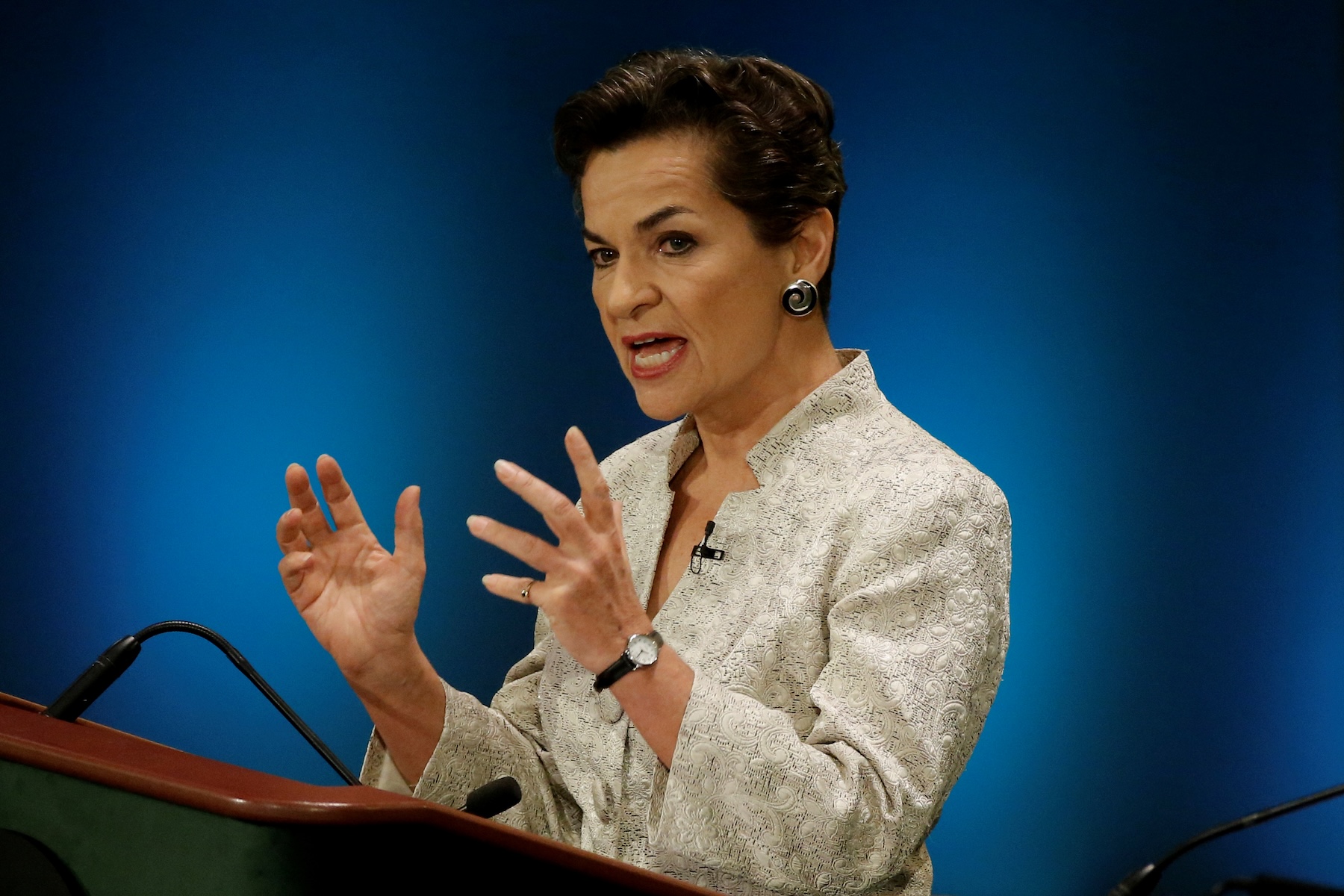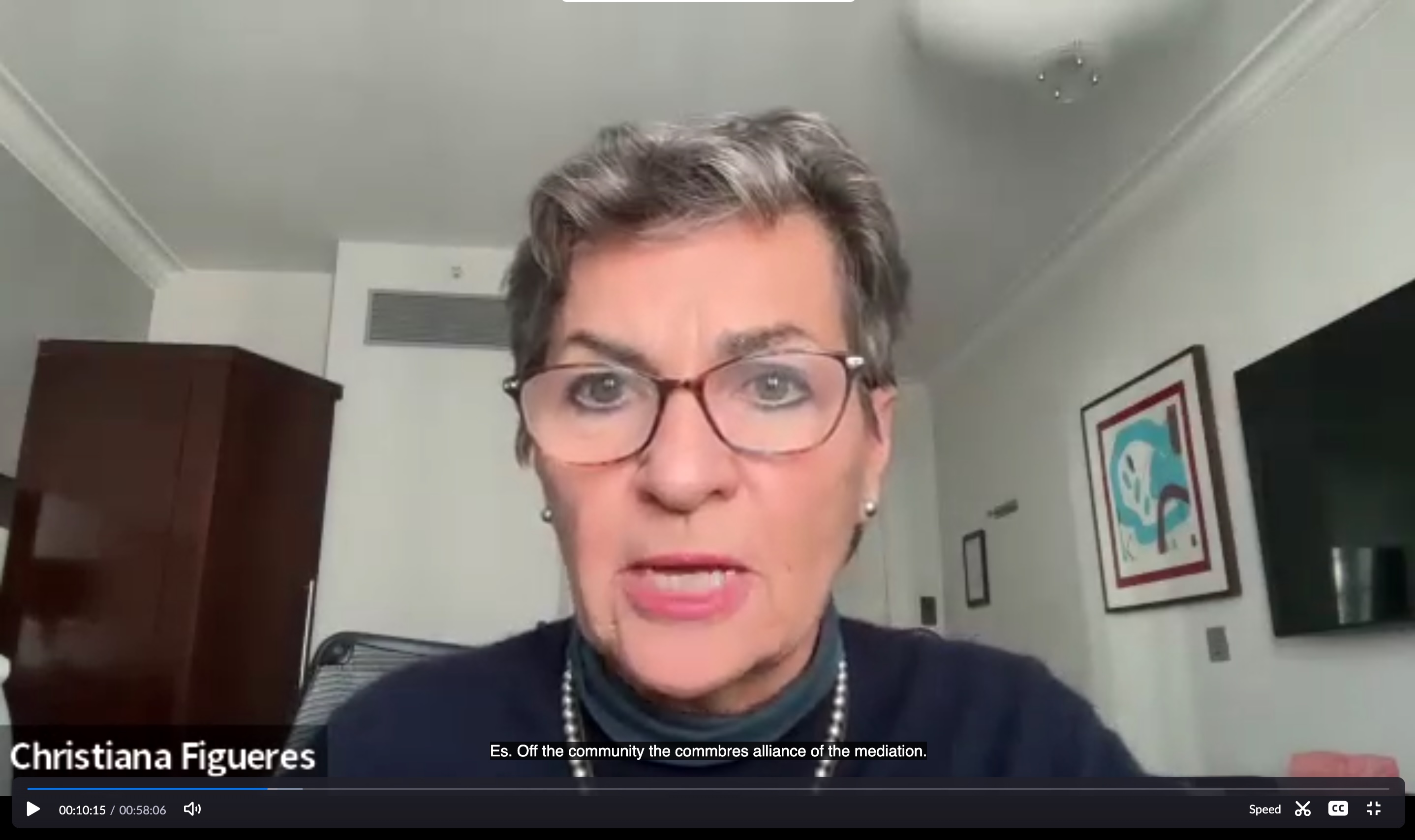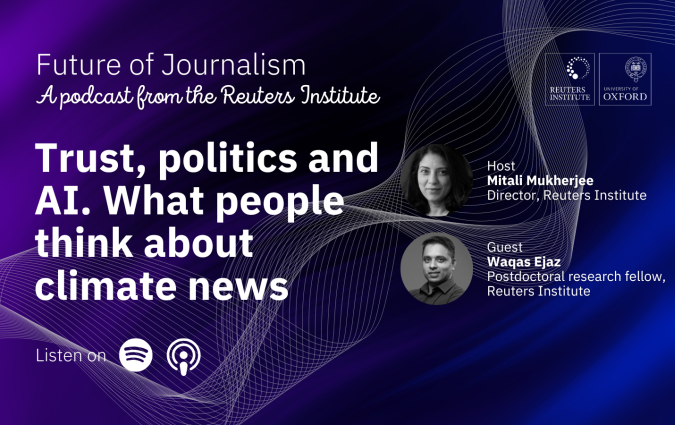Keep things simple and cut the blame: five lessons from Christiana Figueres on covering climate change

Former United Nations climate chief Christiana Figueres speaks during a debate at UN headquarters in New York. REUTERS/Mike Segar
Christiana Figueres is best known as one of the architects of the Paris Agreement, the 2015 international treaty designed to keep global temperatures from rising well below two degrees.
In the years since the agreement was signed, this Costa Rican diplomat has become a powerful figure in the world of climate action and communication outside of the United Nations Framework Convention on Climate Change (UNFCC), co-hosting the popular podcast Outrage + Optimism and speaking around the world on the challenges and opportunities of addressing climate change.
She recently spoke with the Institute’s Oxford Climate Journalism Network, a growing community of 700 journalists from more than 120 countries
"Take complexity and communicate it with simplicity,” Figueres told our members. “That is a huge job. I would argue that that is your most important job. It is not about taking complexity and communicating it in a complex fashion, because then the value added is very little. The difficulty that you are putting your teeth into, and for which I thank you, is how do you take complex issues and communicate them simply in a way that inspires people to take action and to assume responsibility. That is your role."
Here are five takeaways from our conversation with Figueres, from how to think about this year’s COP30 process, to the influence of fossil fuel companies, and the challenges of communicating climate risks.
1. The world is heading in the right direction – but too slow
Figueres used a phrase in Spanish to describe the current state of action on climate change: “Vamos bien, pero estamos mal.”
“This is a phrase in Spanish that means we're moving in the right direction, but we are far behind, both at the same time,” she explained.
The former UN climate chief argued that the current political moment is dire, citing that we broke the 1.5C degree ceiling in 2024 and that climate impacts accounted for $229 billion in costs, greater than the year before.
But she also argued that the world is also on an exponential curve trajectory of many of the climate solutions: last year also saw twice the level of investment into clean technology versus fossil fuels and falling prices in technologies like solar and electric batteries.
“I think of those two curves – the exponential curve of impacts and the exponential curve of solutions – as competing against each other, and they will cross at some point, we don't know when,” she said.
She said the decarbonisation of the global economy is now irreversible, “with or without the craziness in the United States.”
“What is still not at the level [needed] is speed and scale,” she said. “It’s not the direction, it's the speed and scale.”

2. “Composting” pain and anger
With her organisation, Global Optimism, Figueres champions a theory of change that says that all change starts at a personal level. In an age where journalists are feeling a profound mental health impact due to their experiences covering climate change, Figueres’ invitation comes as a possible way forward.
“We first have to look at our interior world to figure out where we are on this. Where does it hurt? Where is my pain? Where is my anger? What is my burnout? Where is the grief? Because all of us carry that to a certain degree, but most of us are not even aware of how it is blocking the impact that we could have in the work that we do,” she said.
Figueres offered the analogy of composting to understand this idea. Compost comes from organic matter, she said, that has been at the top of its performance: a flower, a tree, a fruit, a vegetable. But then something happens (it’s half-eaten, falls off, reaches the end of its natural life) and decomposes.
“Decomposition does not mean that it loses its potential for regeneration, and that is the basis of composting,” she said. “Similarly, we as human beings, we have a huge amount of energy... but sometimes something happens out there: there's all this bad news, or funding is removed from us. That makes us wilt, and we become angry and depressed.
“The magic here,” she explained, “is to take that and change it around and be able to derive the power from the pain. We can change that, and precisely because of that pain and because of the anger, I'm going back out and I'm going to fight the good fight.”
Figueres stressed that this requires a serious degree of mindfulness and understanding: but it is entirely possible: “It's the most transformational experience that we can have for ourselves, and the best way that we can prepare ourselves to have more impact.”
3. Holding fossil fuel companies accountable
For many years, Figueres supported involving fossil fuel companies in climate conversations: they had smart people, deep pockets and an understanding of our energy systems. That was then. Now she says that these companies have decided to block climate solutions.
“They have the possibility to be a part of the solution, but they have to choose to do that, and they haven't,” she said. “As of Russia’s illegal invasion in the Ukraine, they all switched over, and they abandoned their climate goals. They just abdicated their responsibility.”
So, how should journalists consider these companies? “They have to be covered from a deep sense of accountability,” she said, “holding them accountable for what they're doing, holding them accountable for the fact that they have known [about climate change] since 1960s, holding their feet to the fire. This is the only thing that we can do. We cannot afford to just give them an escape card at this point.”
In particular, she focuses on the silent role of fossil fuel companies in the new US administration. “One of the root causes of what is happening is the pressure and the financial support from the fossil fuel industry,” she said. “What is very interesting to me is that while they have their fingerprints all over this craziness, that they have managed to hide themselves behind some pillar.”
4. The struggle to connect with the public
Asked by a member of our climate network whether climate campaigners have lost connection and support from the public and why, Figueres agreed and offered three possible reasons: because they offer data that is often not visible, because they choose the “high horse of morality and preach to people and make them feel guilty, or make them feel like they're not doing the right thing or blaming them”, and because the message gets too complicated.
“The messengers on the other side [those seeking to slow efforts] have a very clear purpose and a very clear message: delay climate policy as long as possible, period, full stop. That's all they do,” she said, “[while we] are trying to be true to what we know is true. We're trying to protect human rights. We're trying to protect gender rights. But we trip over our own complexity. The complexity that we know to be true is not necessarily one that must be continually messaged because it loses people.”
“So let's act out of the complexity, but speak with simplicity,” she said.
For journalists, sharply declining trust and rising news avoidance – as documented by the Reuters Institute’s Digital News Report – means that journalists have to be proactive in reaching audiences with climate coverage.
“We have to be very creative and meet people where they are. We cannot have the attitude of ‘If we will build it, they will come’. They won't come. We have to actually go and find where they are and provide them with the information where they are.”
5. COP30 is a “milestone, not a destination”
COP30 will take place in Belém, Brazil in November 2025. This year’s event will be a landmark conference, marking a crucial deadline for countries to submit their Nationally Determined Contributions (NDCs), plans they present every five years with their efforts to reduce national emissions and adapt to the impacts of climate change.
But the summit will also be a symbolic event, hosted in a city often called the “gateway to the Amazon” – at a time when international politics on climate appears particularly divisive.
Figueres said there was a crucial difference between recent conferences hosted in “petro states” – the two previous COPs were hosted in Azerbaijan and the UAE – versus in a country that, while a fossil fuels producer, has the “largest lungs” in the world. “We are in the hands of Brazil, that is a country that really understands its responsibility, not only with respect to the Amazon, but also its leadership worldwide,” she said.
However, Figueres cautioned that COP30 should not be framed as a make-or-break event. “Let us not commit the sin that we commit every single year. That is to say, ‘Okay, ‘this is the last chance to do x, y or z’,” she said. “This is not about single conferences. This is about a trajectory. This is about the direction of travel. This is about consistency in our efforts. Let's please see COP30 as a milestone, not as a destination.”
In every email we send you'll find original reporting, evidence-based insights, online seminars and readings curated from 100s of sources - all in 5 minutes.
- Twice a week
- More than 20,000 people receive it
- Unsubscribe any time







